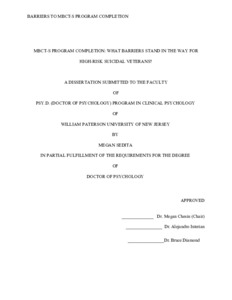Please use this identifier to cite or link to this item:
http://hdl.handle.net/20.500.12164/3443| Title: | MBCT-S Program Completion: What Barriers Stand in the Way for High-Risk Suicidal Veterans? |
| Authors: | Sedita, Megan |
| Keywords: | Psychology;Barriers;MBIs;Mindfulness;Veterans |
| Issue Date: | May-2024 |
| Publisher: | William Paterson University |
| Abstract: | Suicide among U.S. Veterans is a critical public health problem. Strides in developing and disseminating evidence-based suicide prevention interventions have been made. Improving treatment engagement among individuals, including Veterans, at risk of suicide is critical in the fight against suicide. In a step towards mitigating treatment non-completion, the current program evaluation examined Veteran perceptions of barriers to completion of one such evidence-based intervention, Mindfulness-Based Cognitive Therapy to Prevent Suicide (MBCT-S). Specifically, the aim was to determine if Veteran endorsement of cultural or educational barriers at baseline was related to MBCT-S program completion. Baseline data was collected from 114 MBCT-S participants as part of a larger effectiveness trial of MBCT-S via telehealth for Veterans at risk of suicide. Five items measuring cultural and educational barriers were created by mindfulness experts on the MBCT-S program team based on a review of the current literature on barriers to Mindfulness-Based Intervention (MBI) completion. Independent measures t-tests and then a multivariate logistic regression were used to compare barrier endorsement between MBCT-S completers, i.e., those completing at least four of eight group sessions, and non-completers while controlling for depressive and hopelessness symptom severity, which are known barriers to treatment completion among suicidal individuals. There were no significant differences in endorsement of each of the five barrier items between those who completed the MBCT-S program and those who did not. Depressive and hopelessness symptom severity were also not different between program completers and non-completers. The logistic regression model was not significant, (2 (9) = 14.23, p = .114). Notably, an association between African American race and MBCT-S program non-completion was observed. As such, more research is needed to understand what stands in the way of MBCT-S program completion. |
| URI: | http://hdl.handle.net/20.500.12164/3443 |
| Appears in Collections: | Theses & Dissertations |
Files in This Item:
| File | Description | Size | Format | |
|---|---|---|---|---|
| Sedita_MBCT-SProgramBarriers.pdf | 318.37 kB | Adobe PDF |  View/Open |
Items in DSpace are protected by copyright, with all rights reserved, unless otherwise indicated.
